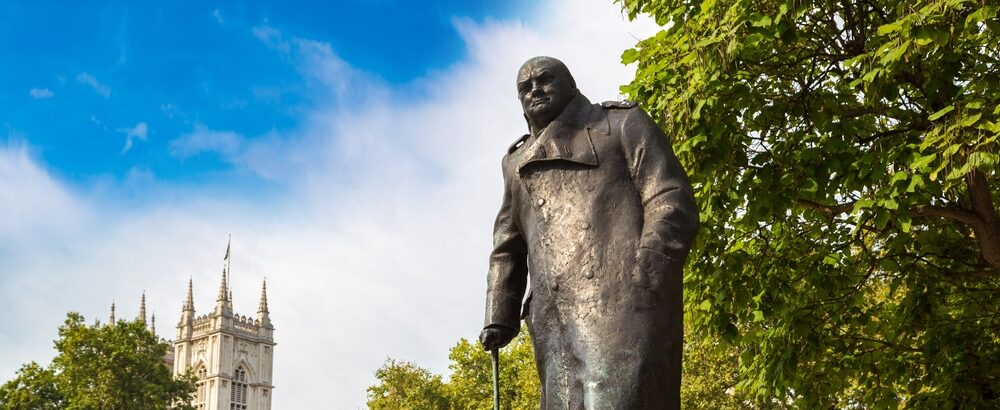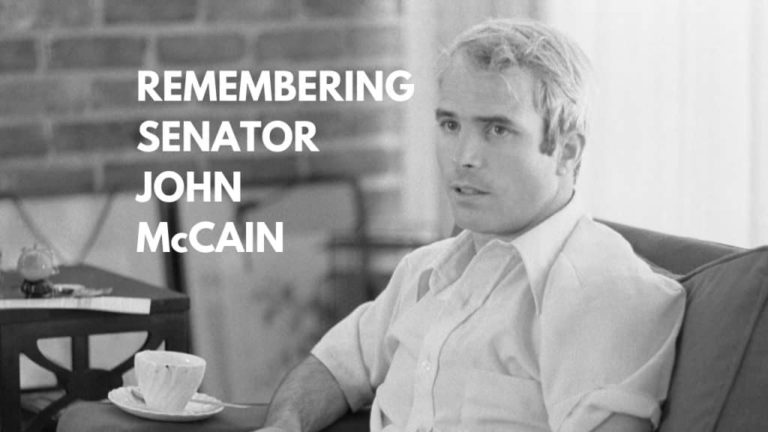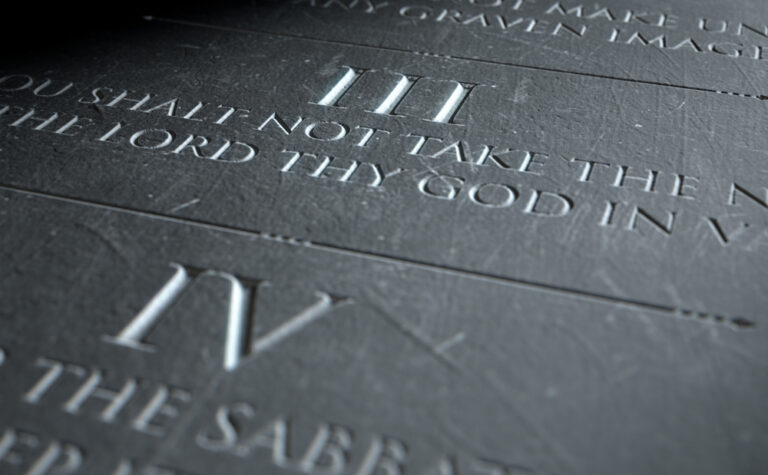History as “State Religion”? A Response to Tucker Carlson’s Controversial Interview with Daryl Cooper
Editor's Note: The views and opinions expressed in this article are those of the author and do not necessarily reflect the official policy or position of Regent University, its faculty, administration, or affiliates.
In the wake of Tucker Carlson’s well-known recent interview with podcaster Daryl Cooper, in which they discussed Winston Churchill, Adolf Hitler, Nazi Germany, and the Holocaust, historians and public intellectuals have converged by the scores to confront the factual errors and misunderstandings expressed.
Historians such as Andrew Roberts, Niall Ferguson, and Victor Davis Hanson, among many others, have raised serious and well-founded concerns about Carlson’s platforming of patently pro-Nazi views for a worldwide audience. To date, Carlson’s interview with Cooper has garnered approximately 35 million views.
Carlson praised Cooper, whom he called “the best and most honest popular historian in America.” Also, he seemingly agreed with the latter’s assertions that Churchill was “chief villain of the Second World War” for ensuring a catastrophic European-wide war; that the Nazis never set out to murder European Jews but that they were simply “unprepared” for the millions of prisoners of war in the East; and other claims. As Ferguson has rightly pointed out, these assertions are straight out of the Nazi propaganda playbook of the 1930s and 1940s.
Since the fracas began, scholars have been setting the record straight. One aspect of this interview that has not received sufficient attention is Cooper’s repeated assertions of the Second World War as a “founding mythology” and “a core part of the state religion” that has been coercively imposed on Americans since the end of that great global conflict. Coerced by whom? Cooper does not say, but he insinuates the government is the culprit and that historians are in cahoots to push the standard interpretation that Churchill inspired the British nation to stand up to Hitler’s aggression and that the Allies fought to defeat the evil of the National Socialist regime and its ideology.
Cooper also tilts at windmills. He conjures up patently false claims about the German people and the rise of the Nazi movement to argue that this “founding mythology” must be demolished. For example, in the podcast with Carlson, he said, “[Y]ou had this country Germany that was a sophisticated cultural superpower that was fine, and then they all turned into demons for a few years, and now they’re fine again [after the war]. That’s sort of the official story. I think deep down we all know that makes no sense.” Cooper does not cite a source or a historian to support his claim — a common problem throughout the podcast. The obvious problem is that no historians argue that the German people were demons in the Nazi era — even allowing for Cooper’s hyperbole. Historians focus on causation and do not engage in, let alone rely upon, ad hominem attacks. Cooper’s assertion is not any part of an “official story” of the Second World War.
While the notion of a “founding mythology” is not new and may have a ring of truth to it, specifically in regard to the founding of our nation, the contributions of the Founding Fathers, and the establishment of our Constitution and Bill of Rights, Cooper speaks as if it is codified, enforced, and policed throughout American institutions by powerful entities such as the government and the academy.
Moreover, Cooper contends that this “state religion” imposed from above has legitimized American economic and military intervention in world affairs ever since, from the Korean conflict to the Vietnam War to the War on Terror after 9/11. Thus, the logic follows, if the United States is ever to cease involvement in foreign wars, this mythology must be dismantled. The truth, he contends, must be freed from the shackles of professional historians and the U.S. government.
Cooper speaks as if there is an orthodoxy that professional historians cannot step outside from, lest they suffer blowback or censure in one form or fashion. For Cooper, it takes alternative media, such as podcasts like his at Martyr Made and long-form interview platforms like The Tucker Carlson Show, to revise this “state religion” from the outside — from popular outlets free from the intervention of the state and the academy.
Needless to say (but it needs to be said), these kinds of unsubstantiated assertions sow distrust not only of government, but also historians in the academy, the curators of museums, the public historians of memorial sites, and others. Cooper’s assertions cast suspicion on the good work that academic and public historians do to keep the memory of our shared past alive and relevant for today. His assertions insinuate that all professional historians are part of a vast conspiracy to conceal evidence and hoodwink the American population, tricking them to believe a useful illusion of the past as means to serve a political end today — the American government’s intervention in foreign affairs.
It is true that local, state, and federal governments can (and do) exert pressure on the standards of historical education, such as shaping curriculum and enforcing textbook adoption. By and large, these entities select history texts written by professional historians and educators. But the simple fact of the matter is that the historical profession operates outside the bounds of politics and school board policies — and well beyond their reach to enforce particular historical interpretations.
Cooper’s line of argument reveals a lack of awareness of the historical discipline and methodologies. The bottom line is that historians conduct their own research based on the primary-source documentation. The validity of their arguments is based upon the primary-source evidence they present and their analysis of this evidence. They present their arguments in the public square by writing academic books and journal articles and by going to historical national and international conferences to share their findings. Interpretations that are well argued and well-substantiated with the evidence gain influence in the field and are reflected in popular treatments of history.
Throughout these processes, and at various levels, historians open themselves up to criticism from other scholars interested in the historical topic. If another scholar has a more convincing argument based on primary-source evidence, then their argument wins out in the public square. There’s no government suppression of well-substantiated and well-argued interpretations. The historical profession is not beholden to any one political entity or figure.
For example, historians in the United States have hotly debated the strategic need to drop nuclear bombs to compel the Japanese military to surrender. Gal Alperovitz’s 1965 work Atomic Diplomacy argued that the U.S. government dropped the bombs on Hiroshima and Nagasaki as a strategic means to gain diplomatic leverage against the Soviet Union after the war ended. Historians have engaged in serious debates about the U.S. government’s “need” to drop the bombs to end the war, given Japan’s precarious situation in August 1945 — a debate that further undermined the morality of dropping the bombs on Japanese civilians. It is difficult to see how debates such as these, which directly challenge a supposed “founding mythology,” could happen if there was indeed a government- and academy-enforced monolithic “state religion” on the Second World War.
As in the United States, so also in other nations — including Germany. A case in point is a controversy over the question of whether the German Wehrmacht participated in the atrocities on the Eastern front during the Second World War. This is the “myth of the clean Wehrmacht.” From the end of the Second World War through the 1980s, the prevailing view was that the Wehrmacht was not involved in the atrocities committed against Jews. For decades, this interpretation had been too sensitive and too close to home to challenge. But in the 1990s, German historians at the Hamburg Institute for Social Research presented their Wehrmacht exhibit with nearly 1,400 photographs, documenting Wehrmacht participating in the atrocities. Controversy erupted, and a scholarly debate began. Because of the work of professional historians, it’s now clear that the Wehrmacht participated in the atrocities committed on the Eastern front. Scholars have overturned the “myth of the clean Wehrmacht” based on careful and convincing historical research. This is just one example among many that can be named.
At the bottom of Cooper’s argument seems to be the concern for a government that has become oppressive, even to the point of controlling the narrative of history. As a society, we are still smarting from the aftereffects of the COVID pandemic and the shutdown, and we are understandably concerned about government overreach and oppression.
Yet, Cooper’s interpretations on the Second World War lack evidence and coherence. Even worse, they advance Nazi arguments as a way to diminish the solid historical work that has been done since the end of the war. Such unsubstantiated views should not be platformed for an audience of millions, but should be swiftly confronted with historical facts.
William Skiles is Associate Professor of History and the Associate Dean of Academics in Regent University’s College of Arts and Sciences. He is the author of Preaching to Nazi Germany: The Pulpit and the Confessing Church (Fortress Academic, 2023).







